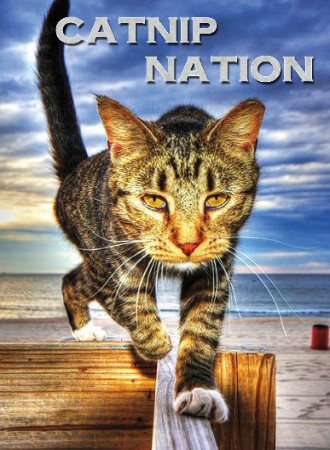
Catnip Nation 2019
Distributed by Passion River Films, 154 Mt. Bethel Rd., Warren, NJ 07059; 732-321-0711
Produced by Lennon Nersesian and Tina Traster
Directed by Tina Traster
Streaming, 77 mins
High School - General Adult
Activism; Animal Welfare; Documentaries
Date Entered: 06/10/2020
Reviewed by Shanna Hollich, Collections Management Librarian, Wilson CollegeCatnip Nation tells the stories of three different groups of people, in three different parts of the United States, caring for feral and stray cats in their communities. While “cat colonies” such as those in the film are a problem in many areas of the world, the animal welfare advocates featured in this documentary have faced hostility from neighbors and local politicians and, in some cases, criminal charges and legal persecution for their choice to feed and care for the unhomed cats in their neighborhoods.
This is a film with a strong hook and a lot of promise: given the trailer and the synopsis, one could reasonably expect strong arguments for animal welfare activism and bonus footage of adorable cats. However, the film itself is jumbled and its message frequently misses the mark.
The structure of the film is difficult to follow and not immediately clear. After several minutes of viewing, we discover that we are following three distinct stories in three different states involving people with wildly different methods of caring for these animals and different motives for doing so. One story involves a partnership with a local trap-neuter-release nonprofit organization, one involves a man attempting to care for cats at his previous job site and stumbling into local political activism along the way, and the third involves an elderly couple putting out food and water for neighborhood cats and then facing criminal charges for doing so. The narrative frequently jumps between these three disparate stories with no accompanying title card, change in camera style, or any other attempt to let us know we have moved from one story to another, so it becomes difficult to keep track of which details belong to each.
The narrative is unclear and frequently strays from the central theme of animal welfare activism. The first story is introduced through the abrupt and impromptu sharing of the tale of a brutal rape and murder – not what one would expect from a documentary about stray cats. This graphic story is dropped into the narrative with no warning, and its relationship to animal welfare activism is never made clear – we discover that the victim was the sister of someone caring for these cats, but no other context is provided for why these details are included. Perhaps this early interaction with a brutal crime influences that activist’s later associations with the criminal justice system? We as viewers are left simply to wonder, and to transition ourselves unceremoniously back to pictures of cats without context. Similarly, the documentary later begins to make a strong argument for trap-neuter-release (TNR) programs and how effective they can be in controlling feral and stray cat populations, but TNR is discussed for several minutes before anyone explains what it is or what the acronym stands for, and the thread is quickly abandoned. We discover through title cards (“Former Director of X Organization”) that the TNR organization being highlighted has disbanded, but we are never told why or how that happened or the extent of the involvement of TNR or this organization in local politics.
This film may be appropriate for adult audiences interested in entry-level engagement with and arguments for animal welfare, particularly as it relates to stray and feral cat colonies. However, there is an extreme focus on the minimal legal consequences involved, presumably to highlight the absurdity of a municipality choosing to make it illegal to feed cats, but this focus is particularly obtuse given current events. Moreover, the flaws in narrative structure, the disjointed film editing, and the extreme lack of focus in content makes this film difficult to watch. Viewers are likely to turn here for an inspiring tale of do-gooders defending helpless animals, but this documentary doesn’t deliver.
Awards:
Winner – Best Documentary, Hoboken International Film Festival, 2019; Winner – Documentary Feature Audience Choice, 19th Annual Kansas International Film Festival, 2019; Best Feature Documentary, Big Apple Film Festival 2019 Summer Edition